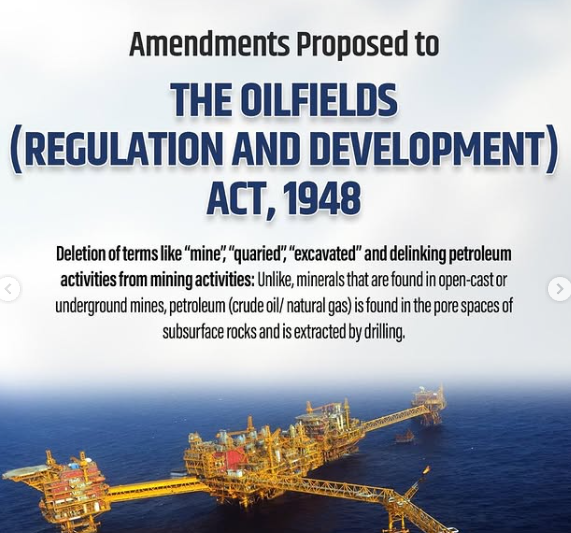Oilfields Amendment Bill, 2024
(Source: Indian Express; Section: Explained; Page: 14)
| Topic: GS2 – Polity |
| Context: |
|
Analysis of News:

What is the Oilfields Bill?
- The Oilfields Bill amends the Oilfields (Regulation and Development) Act of 1948, which originally governed both oil and mineral operations.
- The amendment seeks to delineate the regulation of petroleum from mining activities, aligning it more closely with contemporary needs in the oil and gas sector.
- By doing so, it aims to boost domestic production and reduce reliance on imports.
Key Provisions of the Oilfields Bill
Definition of Mineral Oil
- The Bill defines “mineral oils” comprehensively, encompassing hydrocarbons like crude oil, natural gas, and petroleum in various forms.
- It excludes resources like coal, lignite, and helium associated with coal or shale, which remain under the Mines and Minerals Act.
Petroleum Leases
- The Bill introduces “petroleum leases” as a replacement for “mining leases.” These leases cover activities like prospecting, exploration, development, production, and disposal of mineral oils.
- It aligns with the goal of clearly demarcating the regulatory framework for petroleum operations.
Private Investment and Lease Protections
- Provisions in the Bill encourage private sector participation by safeguarding existing mining leases and offering guarantees against adverse changes during the lease period.
- It removes criminal penalties for violations and replaces them with higher financial penalties, fostering a more investment-friendly environment.
Criticisms and Concerns
Impact on State Rights
- Critics argue that reframing the Act’s focus from mining leases to petroleum leases could diminish state powers to tax and collect royalties from petroleum activities, potentially shifting control to the Union under Entry 53 of the Union List.
- Despite assurances from the Union Minister, concerns about reduced state autonomy persist.
Environmental Risks
- The push for private sector involvement raises questions about environmental safeguards. Opposition members have emphasized the need to prioritize public sector enterprises like ONGC, which have stricter environmental oversight, over private companies.
Demand for Greater Scrutiny
- Some opposition leaders, such as DMK MP N R Elango, have called for the Bill to be reviewed by a select committee, citing apprehensions about its implications for federal structure and state interests.
Conclusion
- The Oilfields (Regulation and Development) Amendment Bill, 2024, represents a significant policy shift aimed at enhancing domestic petroleum production and fostering private investment.
- However, its potential to centralize regulatory power, impact state revenues, and pose environmental challenges requires careful scrutiny and balanced implementation.
| Significance of the Amendment |
|
| Practice Question: Discuss the key provisions and implications of the Oilfields (Regulation and Development) Amendment Bill, 2024. (250 words/15 m) |

